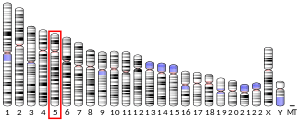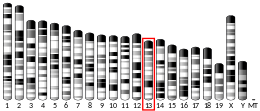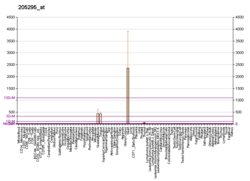CKMT2
Creatine kinase S-type, mitochondrial is an enzyme that in humans is encoded by the CKMT2 gene.[5][6]
Mitochondrial creatine kinase (MtCK) is responsible for the transfer of high energy phosphate from mitochondria to the cytosolic carrier, creatine. The "energy-rich" gamma-phosphate group of ATP that is generated by oxidative phosphorylation inside mitochondria is trans-phosphorylated to creatine (Cr) to give phospho-creatine (PCr), which then is exported from the mitochondria into the cytosol, where it is made available to cytosolic creatine kinases (CK) for in situ regeneration of the ATP that has been used for cellular work. Cr then is returning to the mitochondria where it stimulates mitochondrial respiration and again is charged-up by mitochondrial ATP via MtCK. This process is termed the PCr/Cr-shuttle or circuit. MtCK belongs to the creatine kinase (CK) isoenzyme family. It exists as two isoenzymes, sarcomeric MtCK and ubiquitous MtCK, encoded by separate genes. Mitochondrial creatine kinase occurs in two different oligomeric forms: dimers and octamers, in contrast to the exclusively dimeric cytosolic creatine kinase isoenzymes. Sarcomeric mitochondrial creatine kinase has 80% homology with the coding exons of ubiquitous mitochondrial creatine kinase. This gene contains sequences homologous to several motifs that are shared among some nuclear genes encoding mitochondrial proteins and thus may be essential for the coordinated activation of these genes during mitochondrial biogenesis.[6]
References
- 1 2 3 GRCh38: Ensembl release 89: ENSG00000131730 - Ensembl, May 2017
- 1 2 3 GRCm38: Ensembl release 89: ENSMUSG00000021622 - Ensembl, May 2017
- ↑ "Human PubMed Reference:".
- ↑ "Mouse PubMed Reference:".
- ↑ Haas RC, Strauss AW (May 1990). "Separate nuclear genes encode sarcomere-specific and ubiquitous human mitochondrial creatine kinase isoenzymes". J Biol Chem. 265 (12): 6921–7. PMID 2324105.
- 1 2 "Entrez Gene: CKMT2 creatine kinase, mitochondrial 2 (sarcomeric)".
External links
- Human CKMT2 genome location and CKMT2 gene details page in the UCSC Genome Browser.
Further reading
- Payne RM, Strauss AW (1995). "Expression of the mitochondrial creatine kinase genes". Mol. Cell. Biochem. 133-134: 235–43. doi:10.1007/BF01267957. PMID 7808456.
- Qin W, Khuchua Z, Cheng J, et al. (1998). "Molecular characterization of the creatine kinases and some historical perspectives". Mol. Cell. Biochem. 184 (1–2): 153–67. doi:10.1023/A:1006807515892. PMID 9746319.
- Klein SC, Haas RC, Perryman MB, et al. (1991). "Regulatory element analysis and structural characterization of the human sarcomeric mitochondrial creatine kinase gene". J. Biol. Chem. 266 (27): 18058–65. PMID 1917943.
- Haas RC, Korenfeld C, Zhang ZF, et al. (1989). "Isolation and characterization of the gene and cDNA encoding human mitochondrial creatine kinase". J. Biol. Chem. 264 (5): 2890–7. PMID 2914937.
- Richard I, Devaud C, Cherif D, et al. (1994). "The gene for creatine kinase, mitochondrial 2 (sarcomeric; CKMT2), maps to chromosome 5q13.3". Genomics. 18 (1): 134–6. doi:10.1006/geno.1993.1437. PMID 8276398.
- Qin W, Khuchua Z, Klein SC, Strauss AW (1997). "Elements regulating cardiomyocyte expression of the human sarcomeric mitochondrial creatine kinase gene in transgenic mice". J. Biol. Chem. 272 (40): 25210–6. doi:10.1074/jbc.272.40.25210. PMID 9312135.
- Qin W, Khuchua Z, Boero J, et al. (1999). "Oxidative myocytes of heart and skeletal muscle express abundant sarcomeric mitochondrial creatine kinase". Histochem. J. 31 (6): 357–65. doi:10.1023/A:1003748108062. PMID 10462222.
- Kanemitsu F, Mizushima J, Kageoka T, et al. (2000). "Characterization of two types of mitochondrial creatine kinase isolated from normal human cardiac muscle and brain tissue". Electrophoresis. 21 (2): 266–70. doi:10.1002/(SICI)1522-2683(20000101)21:2<266::AID-ELPS266>3.0.CO;2-9. PMID 10674997.
- Schlattner U, Wallimann T (2000). "Octamers of mitochondrial creatine kinase isoenzymes differ in stability and membrane binding". J. Biol. Chem. 275 (23): 17314–20. doi:10.1074/jbc.M001919200. PMID 10748055.
- Schlattner U, Wallimann T (2002). "A quantitative approach to membrane binding of human ubiquitous mitochondrial creatine kinase using surface plasmon resonance". J. Bioenerg. Biomembr. 32 (1): 123–31. doi:10.1023/A:1005576831968. PMID 11768757.
- Schlattner U, Möckli N, Speer O, et al. (2002). "Creatine kinase and creatine transporter in normal, wounded, and diseased skin". J. Invest. Dermatol. 118 (3): 416–23. doi:10.1046/j.0022-202x.2001.01697.x. PMID 11874479.
- Wendt S, Schlattner U, Wallimann T (2003). "Differential effects of peroxynitrite on human mitochondrial creatine kinase isoenzymes. Inactivation, octamer destabilization, and identification of involved residues". J. Biol. Chem. 278 (2): 1125–30. doi:10.1074/jbc.M208572200. PMID 12401781.
- Strausberg RL, Feingold EA, Grouse LH, et al. (2003). "Generation and initial analysis of more than 15,000 full-length human and mouse cDNA sequences". Proc. Natl. Acad. Sci. U.S.A. 99 (26): 16899–903. doi:10.1073/pnas.242603899. PMC 139241. PMID 12477932.
- Ota T, Suzuki Y, Nishikawa T, et al. (2004). "Complete sequencing and characterization of 21,243 full-length human cDNAs". Nat. Genet. 36 (1): 40–5. doi:10.1038/ng1285. PMID 14702039.
- Schlattner U, Gehring F, Vernoux N, et al. (2004). "C-terminal lysines determine phospholipid interaction of sarcomeric mitochondrial creatine kinase". J. Biol. Chem. 279 (23): 24334–42. doi:10.1074/jbc.M314158200. PMID 15044463.
- Gerhard DS, Wagner L, Feingold EA, et al. (2004). "The Status, Quality, and Expansion of the NIH Full-Length cDNA Project: The Mammalian Gene Collection (MGC)". Genome Res. 14 (10B): 2121–7. doi:10.1101/gr.2596504. PMC 528928. PMID 15489334.
- Guerrero K, Wuyam B, Mezin P, et al. (2005). "Functional coupling of adenine nucleotide translocase and mitochondrial creatine kinase is enhanced after exercise training in lung transplant skeletal muscle". Am. J. Physiol. Regul. Integr. Comp. Physiol. 289 (4): R1144–54. doi:10.1152/ajpregu.00229.2005. PMID 16020522.






